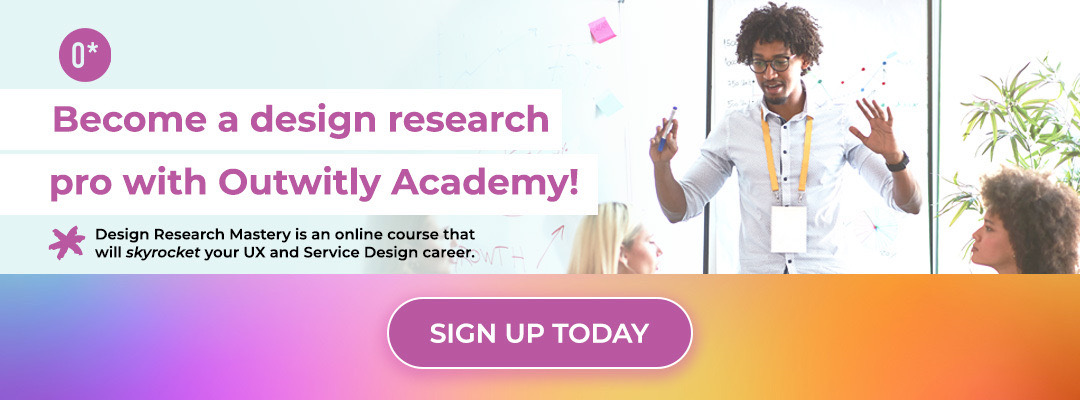
We sat down to talk to our CEO and Founder of Outwitly, Sara Fortier, about the recent launch of Outwitly Academy. Outwitly Academy’s flagship course, Design Research Mastery, is now accepting its first cohort of registrants.
Q: Hi Sara! I’m excited to talk about Outwitly Academy, but let’s back up a step. Where did the business idea for Outwitly Inc. come from and when did you bring it to life?
I started Outwitly Inc. in 2016 after moving back to Canada from living in the San Francisco Bay Area for four years. I wanted to bring the innovative practices and principles I had learned from working there, back to Canada. I also knew I wanted to be my own boss and set the rules for who we worked with and the types of projects we took on. I really believed in the power of using design strategy to bridge the gap between research insights and product design. Outwitly is truly a reflection of my background! From being immersed in the UX and digital product design world – learning the ins and outs of agile product development to the integration of design research and service design – looking at the bigger picture and taking a systems approach to solving those issues by first understanding the people in that system.
For my master’s thesis, I had studied some of the best consulting firms of the time, like Adaptive Path, IDEO, Method, and Ziba Design. I had the chance to interview their founders about what made great end-to-end customer experiences. I spent hundreds of hours pouring over literature on human experience and tried to understand the factors that lead to consistent and meaningful user and customer experiences. At the time (in 2010) this wasn’t as talked about as it is now. I created Outwitly to leverage my passion and utilize the methods I had uncovered in my research. I saw a gap – there were a lot of companies doing UX design, but few taking a more holistic human-centered approach involving research. Outwitly is a UX and service design consultancy that focuses on end-to-end design and research projects.
Q: Why did you start Outwitly Academy?
Outwitly Academy, for a long time, has felt like a pipe-dream. Not because I didn’t have the ideas or the know-how to bring it to life, but because of the time investment required to create something that I felt would be up to my (high) standards and that I would feel proud to put out into the world.
Part of my role as the CEO of a boutique consultancy is to work very closely with the designers and researchers on our team who are doing the work. In my regular conversations with these seasoned professionals (with 5+ years of experience) I find myself coaching them on design and research best practices, change management, and project management strategies. It came to me that there is so much left untaught – that what I have learned over more than a decade is invaluable…
“I want to help others move faster and do better with this knowledge. I believe in this work so much, that to me, giving away these “industry secrets” or “secret sauce” doesn’t matter – as long as more lives are being changed because of great design.”
– Sara Fortier
I remember when I was writing my thesis, I asked someone I admired in the industry if I should be careful about how much of my original research and ideas I share with people – if it might be stolen. And he said to me, “Never be afraid to share your knowledge with the world, what you give out will always come back to you in spades.” I’ve never forgotten that, and so far, he’s been right.
Q: Did you have any concerns or hesitations about launching an online UX & HCD course?
In truth, I’ve always had mixed feelings about online courses and certificates. In fact, those closest to me would know that I often complain about the lack of credentials and standardization in our industry. For example, people don’t take a 4-week online course and suddenly call themselves a lawyer or a doctor. Instead, they have to go through years of schooling, internships (articling or residency), and finally pass an industry exam before they can call themselves that. In the same vein, I believe that service designers and UX designers have a big responsibility to bear in our society and perhaps some more strict credentialing would be useful, but at the same time, I believe that universities could do a better job at preparing students for their professional careers in design and research. I also come from a background of academia. My family are academics, many of them holding PhDs and teaching at universities. In fact, I am very close to my own university/alma mater, Carleton University. I teach UX & service design within the faculty of industrial design and have been doing that nearly every fall since 2015.
Q: At what point in your career did you realize you hadn’t actually been taught how to conduct design research?
No one’s ever said: You do THIS THIS and THIS. Instead, I started bit by bit, being a note-taker in interviews, self-teaching myself grounded theory during my masters so I could properly analyze my research, and learning from social scientists and anthropologists. I also learned a tremendous amount from my professors in school about design thinking, ideation, prototyping, and the human-centered process. But still, all of this learning was not enough to understand how to string together an entire project from start to finish. I’ve learned how to do that by working with other talented consultants (not only consultants in design and research, but talent project managers, product managers, change managers, and communication specialists). I watched and learned and took notes about the things that worked and things that didn’t. One of my gifts is seeing a process once, no matter how messy or complex, and being able to distill the important, repeatable steps into a standard operating procedure. I’ve done that over the years when watching other experts on a project and seeing how they went about it.
Unlike many of my peers in this industry, I have had a relatively linear path in design, so I will never discount the importance of my formal education in industrial design (truly the grandfather of UX and service design).
Q: There are hundreds of online UX & HCD certifications out there. What makes DRM different?
A lot of what is currently being offered is tailored to the brand new or very junior practitioner. Most courses you come across are titled, “UX 101” or “Introduction to Human Centered Design”. Design Research Mastery goes beyond the basics like design theory or the human-centered design process. Instead, we focus on the specifics of research planning, scoping a project, and project scheduling, all the way to my best tips and tricks for creating interview discussion guides, how to know how many users to recruit for research, and how to prepare a diary study. We also dive into translating those findings into something tangible and actionable for your stakeholders.
There are probably hundreds of courses at the 101 level in UX design and research, but, there are few courses that serve intermediate-level designers and researchers who are already established but want to hone their skills and fine-tune their craft. That’s what I want Outwitly Academy to be – a place where people in the industry can come to learn new methods, new skills, how to use new tools, and apply theory to real-world design projects.
Q: Who do you think would benefit most from Design Research Mastery?
Design Research Mastery is perfect for anyone who is tired of feeling imposter syndrome at work and is ready to become a design research expert. A designer who has a solid understanding of best practices and the design process, but, who hasn’t actually run a full-scale design research project in the REAL WORLD would do very well. Many designers we talk to were hired into their current roles and put in a position expected to know how to conduct user research from scratch. They’re smart and qualified, but they don’t have the know-how or toolkit to immediately execute on service design projects to crush major research goals (YET!) This course is also perfect for anyone wanting to transition into service design or design strategy from a UX/UI design role. In my opinion, DRM is for someone who wants to become a UX or service design lead, but needs a little coaching and guidance.
Q: Why do you believe that conducting thorough design research is a valuable tool for companies or businesses? Would you recommend every organization invests in design research, or are some better candidates than others?
The short answer to this question is, yes.
Every single organization that puts out something users or customers will interact with should be conducting design research. If a business can understand what their users or customers need and want early on in the process, they can spend their hard-earned money and valuable time creating a product or service that is guaranteed to be desired and used. By creating a product that’s valuable to your customer, they’re much more likely to offer their loyalty. Through conducting thorough design research, businesses will uncover hidden opportunities for innovation, major pain points in the customer journey, areas of improvement, and opportunities to delight their users and customers in unexpected ways.
Is your company finally ready to take on the work of UX but not sure what the first step is?
Finding out your organization’s UX Maturity level is a great place to begin.
Q: What do you envision happening for a UX or HCD professional after they complete Design Research Mastery?
The first thing that comes to mind is “success.” I see a shift in confidence around their research skills. I want designers to feel self-assured that they can plan an entire research project from start to finish with ease. They will be able to create actionable and insightful design deliverables they are proud to present to their higher-ups. Next, I would say those who understand the intersection of design and research will be given opportunities to advance in their careers because they can translate human insights into real money-making or money-saving opportunities for their companies or organizations.
Q: On the course page it’s mentioned that Design Research Mastery can actually be purchased by teams and organizations to develop employees and teach them new skills. How would employees’ newly acquired design research skills benefit businesses as a whole?
The cost for a company to hire a facilitator to come in and teach an entire team of employees a new set of skills is shockingly high. It can cost thousands of dollars for this person’s time, not to mention the extra charges that accrue for bonus templates and workbooks. I always intended for Design Research Mastery to be something that could seamlessly work with companies to train and develop designers already in the workforce. I’m currently working with several different organizations to get their design teams enrolled in Design Research Mastery. DRM is the perfect opportunity for the personal development budget that is often left untouched throughout the year. The skills acquired would completely transform the ability of designers to conduct robust research and to make a positive impact on a company’s customer experience as a whole. Here’s a great way to present the idea of Design Research Mastery for professional development to a boss or manager.
Is DRM right for your organization? Let’s chat.
Q: A quick moment for a humblebrag and advice for our readers. You own a 7-figure, woman-founded, consultancy. What do you think you’re doing differently that took you to this level of success?
Wow! I wasn’t expecting this question to be in here. Outwitly was not something I built overnight, it took many years of hard work. For me, perseverance and kindness have been the two biggest things I can attribute my success to. The ability to get back up when you’ve been knocked down is so important.
“I have been knocked down over and over again, but in the end, it doesn’t matter. You pick yourself up, dust yourself off, hold true to your vision and move forward with as much grace and kindness as you can muster.”
— Sara Fortier
I try to remind myself that there will always be other clients, other projects, and more people who need this type of work. I also really believe in myself and my ability to do anything I set my mind to. I try to approach everything I do with integrity and try to do it better than the last time. I have also always made a point to be kind to everyone I interact with. Whether that is a client, a team member, another service provider, or my neighbour. As I get older, I realize that your network really is so important and your reputation (intentional or not) is crucial. You never know who will remember you and what might turn into an amazing opportunity five years later. Another thing I can attribute the success of Outwitly to is my team. I was afraid to hire my first team members, but as I did, I realized how much more we could accomplish together than I could ever achieve alone.
Q: Finally, what do you see for the future of Outwitly Academy?
The vision for Outwitly Academy is to create a membership-based experience for UX and HCD professionals to continually be learning and elevating their skillsets. I see it becoming a community where intelligent, like-minded, and career-driven professionals come together to access courses, tools, workshops, downloadables, and perhaps most importantly coaching. There is so much value in being able to access a coach who knows your industry inside and out. To be able to ask them what you should do on your project, or if you hit a roadblock what’s the best next step to take. I would like Outwitly Academy to offer expert coaching in each core discipline. But for now, our flagship course, Design Research Mastery, is open for enrollment and I couldn’t be more excited to take this first step.
Thank you for reading this Q&A with our very own Sara Fortier, CEO of Outwitly Inc. Outwitly Academy’s flagship course, Design Research Mastery, is excited to welcome you – we can’t wait to get started! If you have any questions pertaining to Design Research Mastery, please feel free to reach out to academy@outwitly.com. We look forward to hearing from you!
Resources We Like
Envato Tuts+ on How to Convince Your Boss to Pay for Your Training





